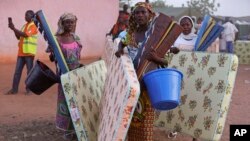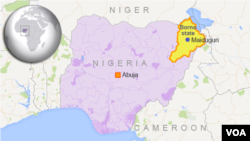Residents in northeastern Nigeria's Adamawa state fled their villages to the state capital this week after a string of deadly attacks by Boko Haram militants that marked the latest in a campaign of violence that has left thousands of people dead.
Between Friday and Monday, the armed insurgents hit at least five different villages in the Michika area. Residents said the fighters arrived on motorbikes and four-wheel drive vehicles and looted and burned homes.
In the small community of Liddle, which has about 150 people, many were still asleep when the militants arrived Sunday morning. Margret Yohanna said she was in bed when she heard the first gunshots.
"The village is very isolated," she said. "As I heard the rebels approaching, I knew my only option was to run."
Yohanna did not hesitate to identify the militants who she said killed her father-in-law, then her husband: "Boko Haram."
Boko Haram
Boko Haram
- Based in the northeastern city of Maiduguri
- Self-proclaimed leader is Abubakar Shekau
- Began in 2002 as a nonviolent Islamist splinter group
- Launched uprising in 2009
- Has killed tens of thousands since 2010
- Boko Haram translates to "Western education is sinful"
- Wants Nigeria to adopt strict Islamic law
Boko Haram controls large parts of Borno state, which borders Adamawa to the north.
Those who escaped the violence in Adamawa fled south to Yola, about 230 kilometers away, where they began arriving Tuesday to join camps for those already displaced. They said at least 100 people had fled from each of at least four communities, but did not know how many the insurgents had killed. Other residents of Adamawa said dozens were dead.
Nigeria is preparing to hold presidential and parliamentary elections on February 14. The Boko Haram insurgency has become a key issue as President Goodluck Jonathan tries to win a new term, with former military ruler Mohammadu Buhari serving as his main challenger.
Jonathan enacted a state of emergency in Borno, Adamawa and Yobe states in May 2013 as part of an effort to fight the militants, but their attacks have continued.
The violence has cast doubts on whether people in parts of the northeast will be able to vote on election day.
Katarina Hoije contributed to this report from Yola.






